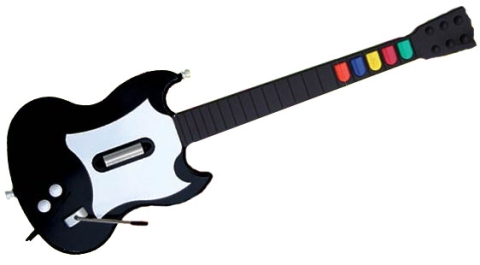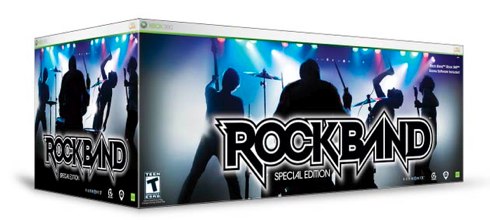
The plastic controller that launched millions of sales
Let’s step back to 2005, before most people ever considered picking up a plastic guitar controller. Video games based around music weren’t unheard of, mainly due to the Dance Dance Revolution series, which had been around since the beginning of the decade. RedOctane, a gaming peripheral company, hooked up with Harmonix, already moderately successful with music games like Frequency. The result was the original Guitar Hero, released for Playstation 2 just in time for the holiday season.
Bundled with a miniature guitar shaped controller with colorful buttons, Guitar Hero went on the be a big seller, a smash hit, if you’ll pardon the pun. Critically acclaimed, and with a fantastic selection of songs (though mostly cover versions), the game ignited a passion in the video game playing public. When you played Guitar Hero, you really felt like a rock star, which made even non-gamers who were fans of the songs in the soundtrack were eager to try it out. By any reasonable measure, Guitar Hero was a success.
A year later, Guitar Hero 2 was released for the Playstation 2, and in early 2007, a slightly enhanced port of this title brought walls of notes and a slick new guitar controller to the Xbox 360. Guitar Hero 2 introduced cooperative play to the series, which let two rockers work together to please their adoring fans and upset their neighbors if the volume was too high. The feeling of being in a band was even stronger, but the best was yet to come.

In 2008, this was the best thing you got under your tree
In 2006, the wild success of Guitar Hero brought great interest from larger publishers, and RedOctane and Harmonix split up as a result. RedOctane and the Guitar Hero name became Activision properties, while Harmonix was snatched up by MTV. The last involvement Harmonix had in the Guitar Hero series was 2007’s PS2-only GH Encore: Rocks the 80s. Activision brought in Neversoft to work on Guitar Hero 3, which also released that year. It was the first game to include wireless controllers and had the likenesses of real musicians. It was also tremendously difficult, to the point of being enjoyable only by the hardest of the hardcore fans.
Harmonix's first solo effort changed the music game genre forever. Rock Band, released a few weeks after GH3, included a drum controller and a microphone for vocal parts. Now, four people could play at once, through a career mode that simulated the rock star experience. Additionally, Rock Band had robust support for regular downloadable content. These innovations were incredibly important to the future of the genre.